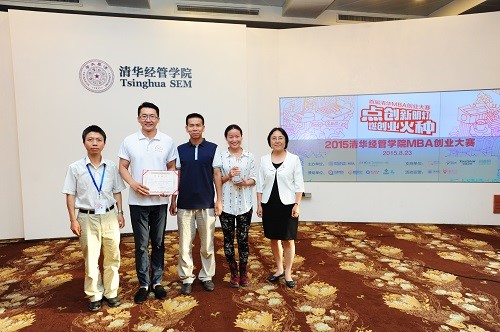The finals of the
inaugural Tsinghua MBA Entrepreneurship Competition were held at the Tsinghua SEM on August 23, 2015. The
competition was jointly organized by the Tsinghua SEM MBA programs and the
Tsinghua x-lab. Through practical learning, the competition aimed to develop
the spirit of innovation and entrepreneurship in MBA students, serving as a
platform and resource support for them. The competition’s joint chairpersons
were assumed by Tsinghua SEM Senior Associate Dean Professor Jian Gao and
Professor Jinliang Li, while the academic chairperson was the Tsinghua SEM
x-lab Academic Director Professor Wei Zhang. The competition lasted over 4
months, which included inter-departmental meetings, entrepreneurship training
sessions, roadshows and various complementary activities.

Tsinghua
SEM Associate Dean Professor Xiaojun Qian (first from right) and Tsinghua x-lab
Academic Director Wei Zhang (first from left) presenting awards to team “Woo
Kong” (gold medalists)
10
finalist teams, which were selected out of 60 teams, gave their presentation
and answered queries from the judges during the last round of the competition.
In the end, team “Woo Kong” was presented with the gold medal, while “Wireless
Charging” and “Fat Tiger Second Hand Luxury Goods Trading Platform” obtained silver
medals. The teams that received the bronze medals were; “Baby Sitter O2O Service
Platform”, “O2O Indoor Sport Shoes“, “Heart Warming Medical Care”, “Travel Companion”,
“Box of Jewels”, “Doraemon HD” and “Simple Goods Second Hand Trading Platform”.
Tsinghua SEM Associate Dean, Professor
Xiaojun Qian, pointed out that since the programs establishment in 1991,
Tsinghua MBA has been continuously developing itself through exploration and
innovation, which have become a tradition. In 2015, the Entrepreneurship Competition
systematically allocated entrepreneurship courses and activities, fully
exemplifying the features of innovation and entrepreneurship in the Tsinghua
MBA education. The competition is also a manifestation of Tsinghua MBA’s
mission and social responsibility. By connecting MBA students with other science
and engineering students, MBA and engineering thought frameworks were
integrated, while managerial experiences were blended with product design
development. Problem solving methods were expanded with limited resources, the
startup process was accelerated and entrepreneurship was cultivated for
success. As a result, the competition was a platform for continuous, healthy,
and rapid growth for the Chinese economy.